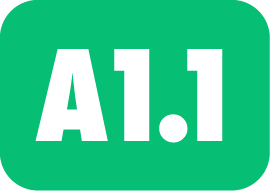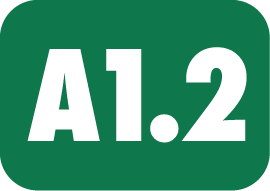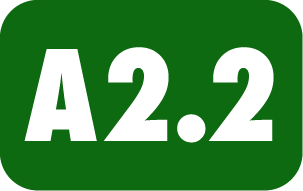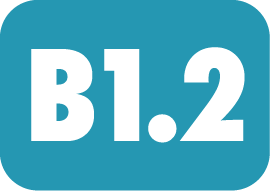The purpose of the Icelandic as Second Language program at Bifröst University is to provide those who do not have Icelandic as their first language opportunity to study the language in order to prepare themselves for University studies in Icelandic. The courses also empower students to use Icelandic in work and life.
The classes in the program span levels A1.2 to B.2 on the European Language framework. Students take a language assessment test at the beginning of their studies so they start with a class that fits their abilities. The program is set up so that those who start with level A1.2 should reach level B1.2 in two years. Student need to pass a language assessment test in order to start a new level, so depending on the student´s progression, completing the program can take longer or shorter.
Classes are online and designed as part-time so students can study alongside work or other studies, such as the University Gateway. Students take one course at a time. Students should expect using 15-20 hours a week working on their studies. Flipped learning methods are used so students will get learning materials online, such as lectures, readings and assigments. Weekly class meetings are on Teams where students will get speaking practice and guidance from the teacher. Students are expected to actively participate in those session.
Students who do not meet general admission requirements for universities and also need preparation in Icelandic as Second Language can take the University Gateway program and the Icelandic program together. If taken together, the programs support each other. Those who do meet general admission requirements for university and only need language preparation can take the program in Icelandic on its own.
Application deadline is June 23.
See the course plan for 2024-2025
Get the curriculum for the Icelandic as Second Language program for the schoolyear 2024-2025
-
Courses and assessnent tests
You can on the links below see a list of all courses and placement tests in the 2024-2025 school year. Those who are at other ability levels at the start of the application can wait until their ability level is available or start at a lower ability level. If attendance is high, courses at more ability levels may be added, so we encourage everyone to apply even if their ability level is not available as yet.
Don't know what capacity level you are at? Here is a self-test that can give you an idea of your ability level. You can take a proficiency test later to have your ability level confirmed.
-
The European Framework
Common European Framework of Reference for Languages Level A - The first steps in learning Icelandic Vocabulary of daily life – greetings, numbers, the calendar 
The first steps in learning Icelandic (6 weeks)*
- Listening: Understand simple sentences about name, job and place of residence
- Reading: Simple sentences about everyday life
- Writing: Simple postcards and forms
- Speech and communication: Introduce yourself, tell about work and residence
* It is assumed that those who start studying Icelandic at the University of Bifröst have already completed this level. Occasionally, the course is taught if many people apply who have not made it.

Me, the family, the residence, the job and everyday situations (2 x 6 weeks)
- Vocabulary: Family, places, transport, everyday things (6 weeks)
- Listening: Common phrases when people talk about themselves (family, place of residence) and speak slowly and clearly
- Reading: Understand very simple texts and common words and phrases, understand advertisements with pictures, signs and greetings
- Writing: Can write simple sentences about family, work and living
Speech and communication: Can tell about yourself, family and interests, ask for news, shop and describe things

Hobbies, daily life, immediate environment, shops and services (2 x 6 weeks)
- Vocabulary: Events, shopping, services, free time, daily life
- Listening: Understand short conversations and the gist of TV news and announcements
- Reading: Can read short news, clear instructions, short everyday stories and short letters, emails and text messages
- Writing: Can write short simple texts about themselves and others. Can send loved ones simple messages about plans.
- Speech and communication: Can ask and answer about news and well-being; described free time, past events; made plans with others, used service organizations and delivered a prepared presentation on a familiar topic

News, short stories, society, places, problems and interesting topics (2 x 6 weeks)
- Vocabulary: Everyday, social (e.g. from the news) and work-related issues. Places, experiences, interests and free time.
- Listening: Understand everyday conversations, can identify topics of discussion and news
- Reading: Can read short texts on familiar topics, instructions, information about features of products and services, can read short columns in newspapers and magazines, can read short simple stories
- Writing: Can write short descriptions of activities, events and experiences (e.g. describe a journey)
- Speaking and communication: Can deal with most everyday situations, can participate in longer conversations, tell about studies and work, communicate about plans and past events, exchange opinions, tell stories, give instructions and give a presentation on a chosen topic.
Level B. Independent use of Icelandic in society. Icelandic in study, work and free time. 
Simple interesting subjects, short novels and TV shows (2 x 6 weeks)*
- Vocabulary: News, current events, vocabulary from novels and TV programs as well as starting to build specialized vocabulary related to work, study and interests
- Listening: Comprehend conversations, television programs and presentations on familiar topics. Understand the instructions for use
- Reading: Can read texts on topics of professional or personal interest, can read newspaper articles and columns, short stories and shorter novels.
- Writing: Can write short coherent texts about experiences and events. Can write short work-related reports, e-mails and formal letters.
- Speaking and communication: Can tell about a read text, describe an experience, state their opinions and justify them, give a prepared presentation and answer questions about it. Be able to initiate, maintain and end a conversation. Can request services, e.g. over the phone.
* Students at level B1.1 and above can take courses from Háskólagátt that are taught in Icelandic alongside the Icelandic courses, which further supports increased skills in Icelandic
Study, work and culture-related content (two or three 6 week courses)
- Vocabulary: Study, work, professional, cultural and conceptual topics
- Listening: understand longer conversations, can follow a clear lecture in a field that the person is familiar with, understand TV programs on interesting topics
- Reading: Can draw conclusions from texts that involve reasoning, can read simple novels, can understand main points in formal letters
- Writing: Can write a detailed description of an experience, dream or imaginary event. Can write letters and emails describing experiences and opinions. Can write about a range of topics well enough for others to follow a story or argument. Can compare different points of view.
-
Program structure and progression of studies
The program is designed so that those who are at level A1.1 when they start should be able to reach level B1.2 in two years. Students take assessment in order to start a new level so the studies can take shorter or longer. Each level is divided into two six-week courses, and each course equals 5 credits at the upper-secondary school level. Students can expect to spend 15-20 hours a week on each course. Typical progression of a student who starts at level A1.1 would be:
LEVEL A (first year) LEVEL B (second year) Haust lota 1 Haust lota 1 Íslenska sem annað mál A.12 Íslenska sem annað mál B.11 fyrri hluti Haust lota 2 Haust lota 2 Íslenska sem annað mál A.21 fyrri hluti Íslenska sem annað mál B.11 seinni hluti Vor lota 1 Vor lota 1 Íslenska sem annað mál A.21 seinni hluti Íslenska sem annað mál B.12 fyrri hluti Vor lota 2 Vor lota 2 Íslenska sem annað mál A.22 fyrri hluti Íslenska sem annað mál B.12 seinni hluti Sumarlota Sumarlota Íslenska sem annað mál A.22 seinni hluti Akademísk íslenska. B.2 -
Admission criteria
Those who have abilities in Icelandic as Second Language at level A1.1. on the European Language framework can start the program. If many apply that have not reached level A1.1 a course at that level might be offered.
When applying to the program for the first-time students take a language assessment test where their abilities are evaluated according to the European Language framework so they can start with a course that fits their abilities. Applicants might have to wait until a class that fits their abilities is available or start at a lower level.
-
Registration fee
The registration fee for the schoolyear 2024-2025 is 75.000 ISK.
Many unions offer financial support for education. Please contact your union for information.
-
Opportunities for further studies
When students have reached level B1.2 students should be able to start univeristy studies in Icelandic if they fulfill other admission requiremtns.
Those who do not fulfill general admission requirements for university can consider completing the University Gateway program.
